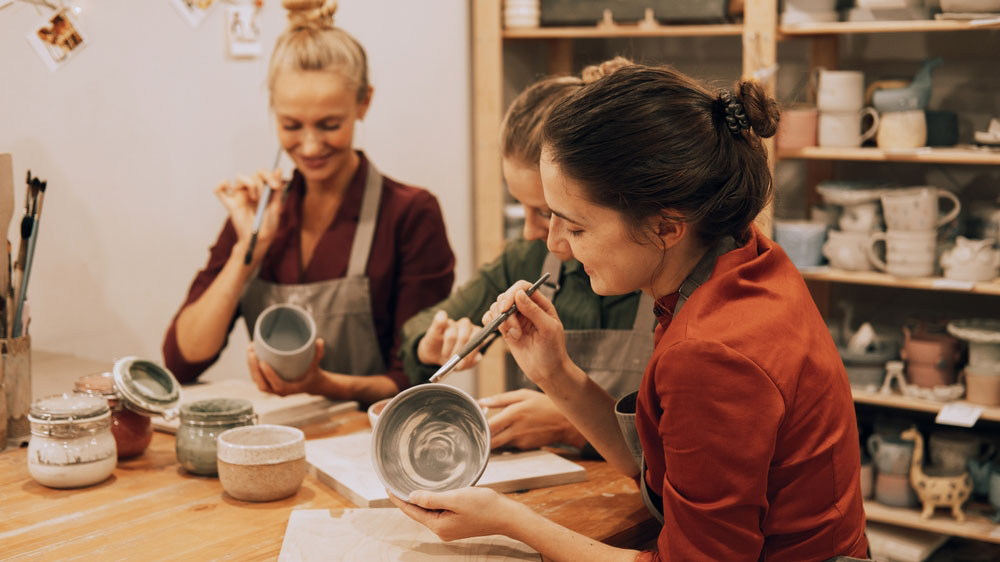The Delicate Art of Weaving Sincere Bonds
Friendship. The word resonates like a promise of complicity, shared laughter, and shoulders to lean on. Yet, in adulthood — between commuting, work, and a thousand notifications — making friends can feel like an accomplishment. We wish it were as simple as when we were kids, and a simple “do you want to play with me?” sufficed. But don’t worry: creating new friendships isn’t reserved for children or extroverts brimming with confidence. There are gentle, effective, and sometimes even playful strategies to invite beautiful souls into your life.
1- Step Out of Your Shell Without Renouncing Your Nature
No, you don’t need to become the star of every party to make friends. However, you will need to take a small step outside of your comfort zone. Start by identifying places or contexts where you naturally feel good: a yoga class, a library, an urban gardening club, a choir… The secret? Consistency. The more you frequent the same spaces, the more familiar you become to others. And familiarity is the springboard for sympathy.
Tip: smile (genuinely), say hello, ask a small, casual question (“Do you come to this class often?” — classic but effective). These micro-openings are what spark great relationships.
2- Dare to Make the First Move (Yes, Even If It’s a Bit Scary)
We often dread approaching others for fear of being awkward or rejected. However, the vast majority of people are thrilled that we show interest in them. Ask a question, give a sincere compliment, or mention a funny anecdote shared in the moment. That’s enough to light the fuse of connection.
A small anti-panic mantra: “I have nothing to prove, I’m here as a friend.”
What to avoid: trying to impress, monopolizing the conversation, or adopting a mask of perfection. People are drawn to what’s real, not what’s polished.
3- Really Listen (And Not Just Wait Your Turn to Speak)
This is probably the simplest and most powerful strategy: being a good listener. You don’t need to give advice or echo your own life experiences. Just listen with presence and interest. Ask open-ended questions, rephrase (“So if I understand correctly…”) and let the other person feel that they have your full attention.
Side effect: you naturally become someone others enjoy spending time with.
4- Nurture the Seeds of Relationship with Consistency
Friendship is like a plant: it needs a bit of care to flourish. Not necessarily daily watering, but regular attention. A small message after a meeting, an invitation to an event, a funny meme shared… Actions that say: “I’m thinking of you, I’d like to include you in my life.”
And if the other person doesn’t respond? Don’t take it personally. Everyone has their own pace. The bond is built together, but one gesture can be enough to restart the dance.
5- Be Yourself… But the Best Version of Yourself
No need to reveal everything upfront or force the connection. But cultivate your authenticity. Talk about what moves you, what excites you, even if it’s not “in style.” Sharing what makes you vibrate attracts people who resonate with the same frequencies.
A little secret: authenticity attracts authenticity. And that’s the recipe for strong friendships.
6- Create Friendship Rituals
A coffee every Wednesday, a monthly walk, a board game on Friday nights… Rituals create regularity, intimacy, and a sense of grounding. They turn scattered connections into true relational habits. Suggest some! Even if they remain occasional, they give the relationship a rhythm.
8- Practice Controlled Vulnerability
Friendships often blossom from shared vulnerability. You don’t need to turn into an open book, but daring to say, “I feel a little lonely right now,” “I’m nervous about talking to strangers,” or “I’m going through a tough time” can build unexpected bridges. Well-measured vulnerability opens doors where the veneer of perfection would shut them.
9- Multiply Opportunities for Meeting New People
If you stay in the same circles and they’re stagnant, it might be time to shake things up a bit. Attend events that intrigue you, even if you’re hesitant. Join online communities around your passions, offer carpooling, organize a participatory picnic. Opportunities for connection are everywhere, but you have to provoke them.
And if the idea of talking to strangers paralyzes you? Start with facilitated encounters: Meetup groups, discussion circles, themed workshops or retreats. People gather there to build connections, which makes the first contact less intimidating.
10- Accept That Some Meetings Won’t Lead Anywhere… and That’s OK
Not all seeds sprout. Sometimes the chemistry isn’t there. Sometimes, you’re interested, but the other person isn’t. Sometimes, you both like each other, but life rhythms don’t align. That’s fine! Making friends is also about learning to let go without judgment. You’ve sown the seeds, and other blooms will come.
11- And Above All: Cultivate Friendship with Yourself
It may seem counterintuitive, but the more comfortable you are with yourself, the more you attract healthy relationships. Friendship with yourself is about speaking kindly to yourself, supporting yourself during tough times, and celebrating yourself in victories. This inner soil nourishes all your outer relationships.
In Conclusion: The Magic of Connection, Within Reach of the Heart
Making friends is neither an exact science nor a marathon. It’s a journey filled with simple gestures, genuine smiles, small risks, and large doses of presence. It’s the art of the unexpected, of moments shared, and of an open soul. A joyful art, sometimes awkward, but always deeply human.
And what if you tried a small act of spontaneous friendship this week? A heartfelt hello, an outstretched hand, an invitation, a confession. Maybe behind this gesture lies your next great friend.
Sources :
- The Psychology of Friendship – APA PsycNet
- Friendship and mental health: what the research says – Medical News Today
- Why making friends in adulthood is so hard – The Atlantic
- The science of making friends – Scientific American
- Social Relationships and Health – Annual Review of Psychology


